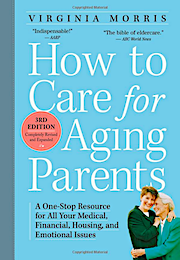Well, that depends on how serious and immediate the need is. Most often, the urgency and severity of a health challenge will be obvious. The situation may be rather mild and inconsequential, it may be a chronic condition, or it may be something extremely serious. It may require a slight effort, a regimen of continuous treatment, or an emergency medical response.
At this moment, we are talking about you, or other caregivers, providing aid after the condition in question has been dealt with and stabilized. However, you should always be prepared to call 911 for help if you see a major problem or recognize the symptoms of a serious health concern. It would also be a good idea to get some first aid training and have a collection of general purpose supplies nearby. You should learn what responses are appropriate to take if you must take action. Should you make a doctor's appointment, consult a physician immediately, or call for a ambulance?
So let's say your client or loved-one has received an initial treatment and is moving forward. You need to determine just how much time and effort you CAN and WANT to provide. And how much help is actually needed. Think it through and take your cues form the advice that medical professionals provide.
What will be your support role? Will the patient recover quickly with a minimum of inconvenience? Will it take a while for them to get back on their feet? Will you need to compensate for the patient's temporary limitations? Does the patient have a condition that will be around for some time? Will it get better or worse as time passes? Has the patient suffered a major injury or contracted a serious disease that will disable them? Is the condition ultimately debilitating and/or life threatening?
Is the patient young, an adult, or old? Is their difficulty physical, mental, or both? Are there any other family members, friends or associates who could join in to provide care? Does the patient have adequate insurance and financial resources to sustain him or her? Is the patient's life, work or responsibilities being disrupted? What is the patient's legal status? These are all questions that factor in to the overall caregiving situation.
Also, keep in mind that caregiving situations can drag on and change over time. You must be as flexible as you are able. You may find yourself participating in any or all of the following four health condition stages: ONSET - TREATMENT - RECOVERY - MAINTENANCE.
Again, reseach and information is the key to knowing what to do, what is best, and what is possible. If you decide to provide care of any kind, at any level, it will affect your life. Do NOT try to go it alone. Remember, lots of people have been through this before and their advice can make your life easier and help you avoid frustrating mistakes. You must be ready and you should be committed. And above all, be patient.
- -

